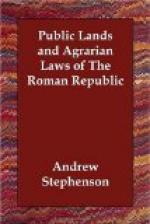If a nation is in a healthful condition politically and economically so that the restorative vigor of nature is not impeded by bad restrictive laws, the devastations of land and losses of human life are quickly repaired. We might the more especially have expected this in a climate so genial and on a soil so fertile as that of Italy. But Roman laws so restricted the right of buying and selling land that in every Italian community none but members of that community, or Roman citizens, could[24] buy or inherit. This restriction upon free competition, by giving the advantage to Roman citizens, was in itself sufficient to ruin the prosperity of every Italian town. This law operated continually and unobservedly and resulted in placing,[25] year by year, a still larger quantity of the soil of Italy in the hands of the Roman aristocracy. In order to palliate the evils of conquest or at least to hide their conditions of servitude, the Romans had accorded to a part of the Italians the title of allies, and to others the privileges of municipia.[26] These privileges were combined in a very skillful manner in the interest of Rome, but this skill did not hinder the people from perceiving that they depended upon the mere wish of the conquerors and consequently were not rights, but merely favors to be revoked at will. The Latini, who had been the first people conquered by Rome and who had almost always remained faithful, enjoyed under the name of jus Latii considerable privileges. They held in great[27] part the civil and political rights of Roman citizens. They were able by special services individually to become Roman citizens and thus to obtain the full jus Romanum. There were other peoples who, although strangers to Latium, had been admitted, by reason of their services[28] to Rome, to participate in the benefits of the jus Latii. The other peoples, admitted merely to the jus Italicum, did not enjoy any of the civil or political rights of Roman citizens, nor any of the privileges of Latin[29] allies; at best they kept some souvenirs of their departed independence in their interior administration, but otherwise were considered as subjects of Rome. And yet it was for the aggrandizement of this city that they shed their blood upon all the fields of battle which it pleased Rome to choose; it was for the glory and extension of the Roman power that they gained these conquests in which they had no share. Some who had attempted to regain their independence were not even accorded the humble privileges of the other people of Italy, but were reduced to the state of prefectures. These were treated as provinces and governed by prefects or proconsuls sent[30] out from Rome. Such were Capua, Bruttium, Lucania, the greater part of Samnium, and Cisalpine Gaul, which country, indeed, was not even considered as a part of Italy. Those who had submitted without resistance to the domination of the Romans, and had rendered some services to them, had bestowed upon them the title of municipia.[31] These municipia governed themselves and were divided into two classes:




